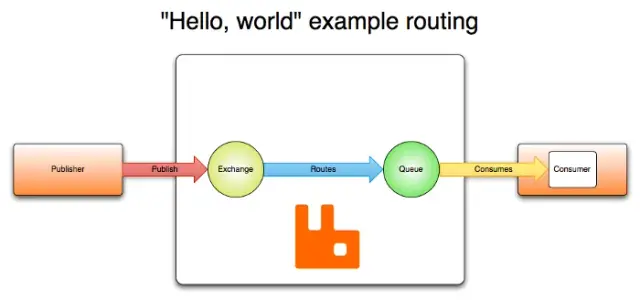The Use of Message Queues in Distributed Systems: RabbitMQ vs. Apache Kafka
Learn the importance of message queues in distributed systems and compare the key features, Advantages, and disadvantages of two popular technologies: RabbitMQ and Apache Kafka.

Distributed systems are built with multiple interconnected components, often spanning across several nodes or servers, to achieve fault tolerance, load balancing, and increased responsiveness. One crucial aspect of ensuring the smooth functioning of distributed systems is the effective management and orchestration of inter-component communication. This is where message queues become essential.
Message queues are communication mechanisms that enable the reliable and asynchronous exchange of messages between different components within a distributed system. These mechanisms maintain consistency, availability, and partition tolerance by ensuring that messages are processed in the right order and can survive failures. They cater to essential requirements of distributed systems, such as:
- Fault tolerance: If a component within a distributed system fails, message queues ensure that messages are not lost and can be delivered to the intended recipients once the system recovers.
- Scalability: As the system size and capacity grow, message queues can load balance the distribution of messages among components by managing the communication traffic efficiently.
- Resilience: Message queues prevent the entire system from going down due to a single component failure or overload.
Various message queuing technologies are available today, each with its strengths and weaknesses. Two of the popular message queuing solutions are RabbitMQ and Apache Kafka. In the following sections, we'll briefly introduce RabbitMQ and Apache Kafka before comparing their features, advantages, and disadvantages.
Understanding RabbitMQ
RabbitMQ is an open-source message-broker software that implements the Advanced Message Queuing Protocol (AMQP). It facilitates scalable, reliable, and high-performing communication between different components and systems.
RabbitMQ is known for its stability, and it's widely used in various industries, such as financial services, e-commerce, and IoT. RabbitMQ's architecture is based on the concept of exchanges and queues. When a message is sent (by a producer), it is forwarded to an exchange, which then routes the message to one or more queues based on predefined routing rules. Consumers, which are components interested in processing those messages, subscribe to queues and consume messages accordingly.
Understanding Apache Kafka
Apache Kafka is a distributed streaming platform designed for high-throughput, fault-tolerant, and scalable messaging and processing of real-time data streams. Kafka is well-suited for handling massive amounts of events, providing low-latency messaging services and acting as a central storage system for logs and events.
Kafka's architecture differs significantly from RabbitMQ's, as it utilizes a distributed log-based architecture. In Kafka, messages are organized in topics, and further divided into partitions. Producers send messages to specific topics, while consumers subscribe to topics to retrieve messages. Each partition acts as an ordered log and ensures that messages are processed in the order they are produced.
In the next sections, we'll dive deeper into comparing RabbitMQ and Apache Kafka by examining their key features, advantages, and disadvantages.
Key Features of RabbitMQ and Apache Kafka
Understanding the key features of RabbitMQ and Apache Kafka will help you decide when choosing the right messaging technology for your distributed system. Let's compare some essential features of both systems.
RabbitMQ
- Exchanges and Queues: RabbitMQ uses a flexible routing system based on exchanges and queues. Exchanges receive messages and route them to one or more queues based on binding rules.
- Message Persistence: RabbitMQ allows you to persist messages to disk, ensuring that they won't be lost if a server crashes or restarts.
- Acknowledgments and Publisher Confirms: RabbitMQ supports acknowledgments and publisher confirms, enabling reliable message delivery and guaranteeing messages are properly processed.
- Multiple Protocols Support: RabbitMQ supports various messaging protocols, such as AMQP, MQTT, and STOMP, providing flexibility and interoperability with different systems.
- High Availability and Clustering: RabbitMQ supports high availability through its clustering and mirrored queues, allowing for fault tolerance and disaster recovery.
- Management and Monitoring: RabbitMQ includes built-in tools and APIs for managing and monitoring your messaging system, letting you assess performance and spot potential issues.

Image source: RabbitMQ
Apache Kafka
- Distributed Log-based Architecture: Apache Kafka uses a distributed log-based system, which ensures high throughput, low latency, and excellent scalability.
- Topics and Partitions: Kafka organizes messages in topics, which can be divided into partitions for parallel processing, enabling high concurrency and improving performance.
- Replication and Fault-tolerance: Apache Kafka replicates data across multiple broker nodes, increasing fault tolerance and failure resilience.
- Stream Processing: Kafka has built-in support for stream processing with Kafka Streams and KSQL, allowing you to perform real-time data processing and analysis within the platform.
- Connect and REST API: Kafka Connect and REST API enable seamless integration with various data sources and sinks, allowing you to build complex data pipelines easily.
- Monitoring and Management: Kafka exposes metrics and leverages tools like Apache Kafka Control Center for monitoring and managing your messaging infrastructure.
Pros and Cons of RabbitMQ
Let's examine the advantages and disadvantages of using RabbitMQ as your message queue system.
Pros
- Message Delivery Guarantees: RabbitMQ provides strong message delivery guarantees with message persistence, acknowledgments, and publisher confirms.
- Advanced Routing: RabbitMQ supports various routing options through its flexible exchange and queue system, allowing for precise message routing and control.
- Management and Monitoring: RabbitMQ's built-in management tools and APIs facilitate easy management and monitoring of your messaging infrastructure.
- Widely Adopted: RabbitMQ has been widely adopted across different industries and is supported by a large community.
- Multiple Protocol Support: With support for various messaging protocols, RabbitMQ provides flexibility in system design and ensures interoperability with different systems.
Cons
- Scalability: RabbitMQ can face challenges with horizontal scalability, which might be a limitation for very high-throughput applications.
- Throughput Limitations: Due to its architecture, RabbitMQ might not provide the same level of throughput as Apache Kafka, especially when handling large volumes of data.
Pros and Cons of Apache Kafka
Here are some advantages and disadvantages of using Apache Kafka as your messaging system.
Pros
- High Throughput: Thanks to its distributed log-based architecture, Apache Kafka offers high throughput, enabling you to efficiently process large volumes of data.
- Low Latency: Kafka provides low latency messaging, ensuring that messages are delivered and processed quickly.
- Scalability: Kafka excels at horizontal scalability, allowing you to distribute your messaging system across multiple nodes to handle heavy workloads.
- Stream Processing: With built-in support for Kafka Streams and KSQL, Apache Kafka enables real-time data processing and analysis.
- Rich Ecosystem: Kafka's ecosystem includes many tools, libraries, and connectors, simplifying integration with various data sources and sinks.
Cons
- Complex Configuration: Apache Kafka's configuration can be complex, requiring advanced knowledge of its internals and an understanding of performance tuning to achieve optimal results.
- Steep Learning Curve: Due to its advanced features and concepts, Kafka can have a steep learning curve for newcomers and may be more challenging to set up and manage.
- Overkill for Simpler Use Cases: Apache Kafka's powerful features might be overkill for smaller-scale or simpler use cases, which can be addressed with more lightweight messaging systems like RabbitMQ.
RabbitMQ vs. Apache Kafka: Use Cases
Understanding the use cases of RabbitMQ and Apache Kafka is essential for choosing your specific application. Here, we'll explore different use cases where each technology excels.
RabbitMQ Use Cases
- Financial Services: RabbitMQ is widely used in financial applications where reliable message delivery is crucial. For instance, RabbitMQ can handle order processing, portfolio updates, and trade executions with its strong message guarantees and advanced routing features.
- IoT Applications: In IoT scenarios with connected devices, RabbitMQ can handle thousands of device-to-device communication requests efficiently. It offers granular routing options and support for various messaging patterns and protocols.
- Real-Time Data Processing: RabbitMQ is suitable for small-scale real-time data processing systems where messages can be prioritized and ordered effectively. Its message acknowledgments ensure that messages are not lost during processing, guaranteeing message consistency.
- Task Queues and Asynchronous Processing: RabbitMQ is favored for task queue management and asynchronous processing, as it supports multiple worker instances to balance the workload. Users can scale the number of workers to handle varying workloads and maintain system performance easily.

Apache Kafka Use Cases
- Real-Time Analytics: Apache Kafka excels at handling large-scale data processing and streaming for real-time analytics. With its high throughput and low latency, Kafka powers applications like monitoring, fraud detection, and recommendation engines.
- Monitoring Systems: Apache Kafka is ideal for monitoring and tracking systems, such as application performance monitoring (APM) and distributed log delivery. Kafka can ingest and process vast amounts of data, enabling system tracking and alerting on infrastructure and software events.
- Stream Processing: Apache Kafka is a popular choice for stream processing applications due to its distributed log-based architecture. Kafka also integrates with various stream processing frameworks, such as Apache Flink, Apache Samza, and Kafka Streams, making it even more versatile for building such solutions.
- Event-Driven Architectures: Apache Kafka is well-suited for complex event-driven architectures, as it natively supports events and provides an extensive ecosystem of tools, libraries, and integrations for implementing event-driven systems.
Integrating Message Queues with AppMaster.io
Integrating RabbitMQ and Apache Kafka with AppMaster.io applications can help optimize communication between distributed systems while using AppMaster's no-code development capabilities. Here's how you can achieve seamless integration with AppMaster:
- API Integration: Both RabbitMQ and Apache Kafka provide RESTful APIs, allowing you to interact with their services programmatically. When creating your application using AppMaster.io, you can define API endpoints that match the desired message queue service API and use them in your application blueprints.
- Code Generation: AppMaster.io's versatile code-generation capabilities can be leveraged to include message queue libraries and client SDKs into your backend, web, or mobile apps. When generating your application's source code, be sure to include the appropriate client libraries to enable connection, publishing, and consumption of messages via RabbitMQ or Apache Kafka.
- Custom Business Processes: With AppMaster's custom business processes, you can create integrations by visually designing message queue interactions. For example, you can design the entire message sending and consuming workflows for both RabbitMQ and Apache Kafka within your AppMaster project.
By integrating RabbitMQ or Apache Kafka with your AppMaster.io applications, you'll be able to take advantage of no-code development features while employing optimal distribution and processing of messages within your distributed systems. This powerful combination can lead to more efficient, cost-effective, and scalable applications.
FAQ
Message queues are communication mechanisms that enable the exchange of messages between distributed systems. They provide fault tolerance, load balancing, and ensure that messages are processed in the correct order. They are essential in distributed systems because they help maintain consistency, availability, and partition tolerance.
RabbitMQ is an open-source message-broker software that implements the Advanced Message Queuing Protocol (AMQP). It is designed for reliability and offers various features, such as message persistence, acknowledgments, and publisher confirms.
Apache Kafka is a distributed streaming platform that enables high-throughput, fault-tolerant, and scalable messaging and processing of real-time data streams. It uses topics and partitions to route and store messages, and it excels in large-scale data processing and streaming.
RabbitMQ is based on the AMQP protocol and uses exchanges and queues for routing messages. Apache Kafka, on the other hand, utilizes a distributed log-based architecture. It uses topics and partitions to route and store messages.
RabbitMQ offers strong message delivery guarantees, good routing options, and useful management tools. However, it can struggle with horizontal scalability, which might be a limitation for high-throughput applications.
Apache Kafka provides high throughput, low latency, and excellent scalability. It also has built-in support for data stream processing. However, Kafka's configuration and management can be complex, and its advanced features might be overkill for simple use cases.
RabbitMQ is well-suited for applications that require high message reliability, advanced routing options, and rich management features. Examples include financial services, IoT applications, and smaller-scale real-time data processing systems.
Apache Kafka excels in large-scale, high-throughput data processing and streaming applications. Examples include real-time analytics, monitoring systems, and distributed log delivery.
Yes, AppMaster.io allows you to integrate third-party messaging systems, including RabbitMQ and Apache Kafka, into your applications. You can leverage AppMaster-generated code to seamlessly introduce message queues into your projects.





